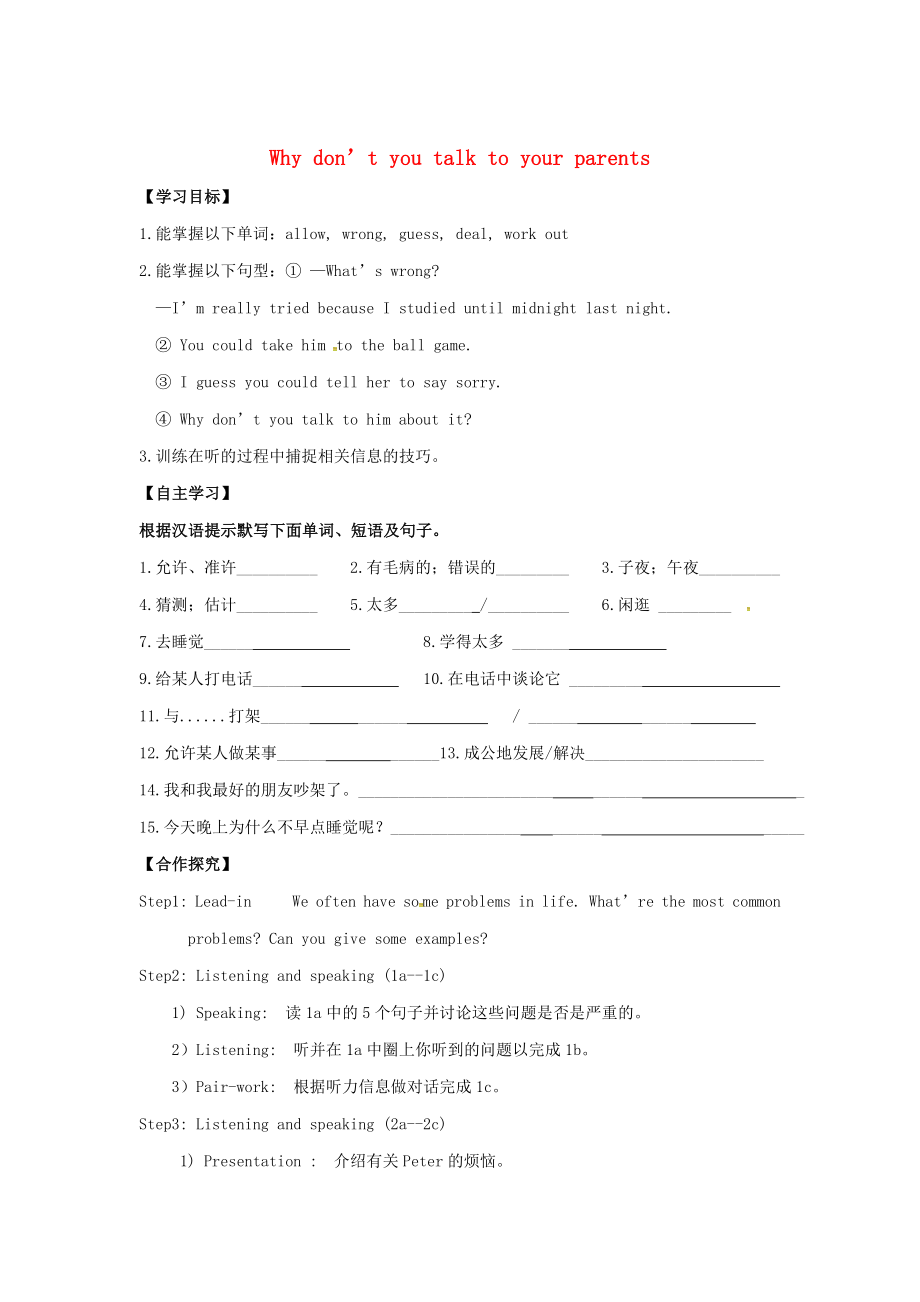《西安市八年級英語下冊 Unit 4 Why don’t you talk to your parents Period 1導(dǎo)學(xué)案人教新目標版》由會員分享,可在線閱讀�,更多相關(guān)《西安市八年級英語下冊 Unit 4 Why don’t you talk to your parents Period 1導(dǎo)學(xué)案人教新目標版(3頁珍藏版)》請在裝配圖網(wǎng)上搜索。
1�、 精品資料
Why don’t you talk to your parents
【學(xué)習(xí)目標】
1.能掌握以下單詞:allow, wrong, guess, deal, work out
2.能掌握以下句型:① —What’s wrong?
—I’m really tried because I studied until midnight last night.
② You could take him to the ball game.
③ I guess you could tell her to say s
2、orry.
④ Why don’t you talk to him about it?
3.訓(xùn)練在聽的過程中捕捉相關(guān)信息的技巧����。
【自主學(xué)習(xí)】
根據(jù)漢語提示默寫下面單詞�、短語及句子����。
1.允許����、準許__________ 2.有毛病的;錯誤的_________ 3.子夜�;午夜__________
4.猜測;估計__________ 5.太多_________ /__________ 6.閑逛 _________
7.去睡覺______ 8.學(xué)得太多 _______
9.給某人打電
3�����、話______ 10.在電話中談?wù)撍?_________
11.與......打架______ ______ / ______ ______
12.允許某人做某事______ ______13.成公地發(fā)展/解決______________________
14.我和我最好的朋友吵架了�。________________________ ______ _
15
4、.今天晚上為什么不早點睡覺呢�����?________________ ______ _____
【合作探究】
Step1: Lead-in We often have some problems in life. What’re the most common problems? Can you give some examples?
Step2: Listening and speaking (1a--1c)
1) Speaking: 讀1a中的5個句子并討論這些問題是否是嚴重的���。
2)Listening: 聽并在1
5�����、a中圈上你聽到的問題以完成1b�。
3)Pair-work: 根據(jù)聽力信息做對話完成1c。
Step3: Listening and speaking (2a--2c)
1) Presentation : 介紹有關(guān)Peter的煩惱����。
2)Listening: 捕捉對話相關(guān)信息以完成2a;2b.
Step 4:Role-play(2d)
1. T: Who will you ask for help when you have problems? S: My friend/Father…
T: Kim, my friend has a problem
6、 with his sister.
I hope you can help him. Let’s come to 2d.
2. Learning the new knowledge
(1)組員聽�����、讀并role-play2d對話�����。(活動: S1: Dave S2:Kim)
(2)讓學(xué)生找出本對話中有用短語及句子��。
give…back, look through, be angry with, work out.
(3)學(xué)習(xí)句型 Why don’t you…? (活動:用Why not do…?互改��。)
3. Language points:
1) allow v.允許
7���、�;準許allow sb.(not)to do sth.(不)允許某人做某事
allow doing sth.允許做某事
e.g. My parents don’t allow me to stay up late. 我父母不允許我熬夜���。
We allow them to smoke. =They allowed smoking in this room only.
2) Although she's wrong, it’s not a big deal.
big deal是英語中的固定搭配���,表示 “重要的事情或狀況”�,多用于非正式交流�。否定用法時常說It’s not
8、a big deal或It’s no big deal.表示說話人并不認為某事有什么了不起���。
3) Hope things work out. 希望事情會好起來�����。這是一種常見的表達法,表示某些不如人意的事情會隨時間的推移逐漸有所改觀���。work out 成功地發(fā)展�;解決����,算出
Mike worked out the math problem by himself. 邁克自己算出了那道數(shù)學(xué)難題。
【達標測試】
Ⅰ. 根據(jù)句意及漢語提示�,填入恰當(dāng)?shù)膯卧~。
1. Li Qiang is a _________(成員) of the school basketball team.
9����、 2. My _________ (看法) are different from yours.
3. Some middle school students can’t get enough sleep under the _________ (壓力) of schoolwork.
4. The car broke down, so we had to _________ (推動) it to the side of the road.
5. He is a _________ (典型的) Englishman.
Ⅱ. 根據(jù)句意及首字母提示�,補全單詞����。
1. The
10、 young man is a f_________ fan. He will go to Brazil to watch the 2014 World Cup.
2. The fans went c_________ when the film star appeared.
3. After she took a short break, she c_________doing the housework.
4. P_________Kate will come to visit me this afternoon, I guess.
5. Driving a car
11�����、 too fast may c_________car accidents.
Ⅲ. 用括號內(nèi)所給單詞的適當(dāng)形式填空�。
1. Our English teacher taught us some reading _________ (skill).
2. My sister won first prize in the school English _________ (compete).
3. He is much _________ (crazy) about basketball than I.
4. My grandma _________ (usual) go
12、es for a walk after supper.
5. Many foreign friends are surprised at the fast _________ (develop) of China.
IV.翻譯下列句子���。
1.你怎么了?
2. 我沒有足夠的錢����。
3.我和我的好朋友吵了一架�。
4. 我該怎么辦?
5. 你應(yīng)該給他打電話。
6. 我父母想讓我每天晚上都呆在家里�。
7. 你為什么不忘記它以便你們可以再次做朋友。
【反思】
 西安市八年級英語下冊 Unit 4 Why don’t you talk to your parents Period 1導(dǎo)學(xué)案人教新目標版
西安市八年級英語下冊 Unit 4 Why don’t you talk to your parents Period 1導(dǎo)學(xué)案人教新目標版

